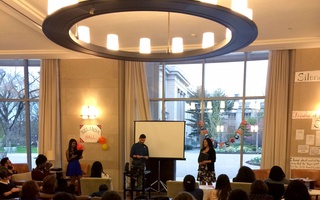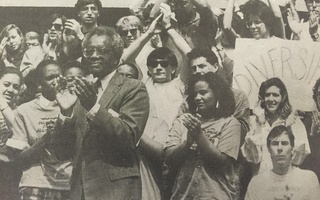Harvard Law School professor Randall L. Kennedy confronted questions about the intersection of race and politics at the Institute of Politics Monday evening, urging attendees to fight racism but not institutions like Harvard.
The event, which comes amidst intense debate and activism about race and inclusion at Harvard and universities across the country, was the first installment of a two-part series called “The Politics of Race: Can We Talk?”{shortcode-16bc748fb60ee7229cae34b8ba24620f002bb9a2}
At the roundtable-style discussion—hosted jointly by the Harvard Political Union and the Politics of Race and Ethnicity program—Kennedy spoke to roughly 40 attendees about issues including affirmative action, the history of discrimination in the United States, and recent campus activism.
Kennedy spoke at a time when waves of activism are rippling across campuses worldwide as students call for the removal of historical symbols and titles associated with slavery and racism. At Harvard, House masters unanimously agreed to change their title, a name some consider reminiscent of slavery.
Yale students are petitioning to rename a residential college named for United States Senator John C. Calhoun; students at Princeton are calling on the university to remove references to President Woodrow Wilson; and in South Africa, University of Cape Town administrators dismantled a statue of British mining magnate Cecil J. Rhodes after widespread student protests.
Meanwhile, a racially-charged incident of vandalism at the Law School—in which black tape was placed over portraits of black professors—intensified existing activism efforts. Police investigated the incident, which remains unresolved, as a hate crime and triggered students to demand better treatment for minorities at the school.
A group of students is also calling for the removal of the school’s controversial shield, which features the crest of a former slave-owning family.{shortcode-3484869bfb52ae43f2fa164878b20dc1e62e26e2}
In a New York Times op-ed from November, Kennedy criticized the Law School activists’ demands and alleged that the black tape incident may have been a hoax. In the article, he called activists’ claims “dubious” and cautioned students against exaggerating the scope of racism at the Law School.
In an interview after the IOP event, Kennedy reiterated his beliefs that activists at the Law School were magnifying problems of discrimination.
“We need to avoid needlessly alienating people who might be our allies,” Kennedy said. “Unfortunately, I think some of that is happening at the Law School. Harvard Law School is not the enemy. And if you are constantly treating Harvard Law School as the enemy, you’ll make it the enemy.”
Kennedy said that while he is “very sympathetic” to activists’ efforts to challenge racism, they must take caution in their approach.
“I wholeheartedly agree with him,” event attendee Tynan G. Jackson ’19 said. “My agreement might be based on ignorance, but the presence of [people of color] on campus and their success after they graduate is representative of the truth that Harvard isn’t our enemy.”
At the Law School, however, student activists and several faculty members have publicly and vocally disagreed with Kennedy, penning editorials in The Crimson, The Huffington Post, and The Harvard Law Record rebutting Kennedy’s claims and arguing that he does not understand the realities of students of color at the Law School.
While Kennedy’s opinions can be controversial, Michael P. Richard ’17, a chair of the Politics of Race and Ethnicity program, said he thought Kennedy’s perspective at the event Monday was important.
“Quite frankly, I want there to be discussions that stir the pot,” Richard said.
Read more in University News
Collage, Petition Detail Harvard Club Worker GrievancesRecommended Articles
-
At Law School, Justice Kennedy Reflects on Cases, Time as StudentKennedy has been a justice on the Supreme Court since 1988. Over the summer, he wrote the majority opinion in the Obergefell v. Hodges, extending the right to same-sex marriage in every state.
-
A Time for Reckoning at Harvard Law SchoolWe must acknowledge the magnitude of American racism — including the way it poisons our own community — and recognize the urgency of pulling it down.
-
 Minow Calls on Michigan Graduates to Combat Injustice
Minow Calls on Michigan Graduates to Combat Injustice -
 Closing a Year of Activism, Law Students Hold Informal Commencement
Closing a Year of Activism, Law Students Hold Informal Commencement -
 Students Carry On Tradition of Race Activism at the Law School
Students Carry On Tradition of Race Activism at the Law School











